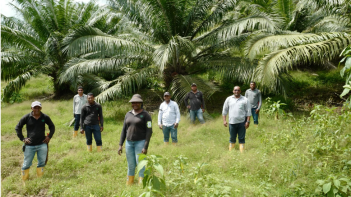RSPO in collaboration with WWF-India, ISEAL Alliance, and Centre for Responsible Business organised a one of it’s kind multi-stakeholder dialogue in Mumbai, India on 27 August 2019. The audience comprised of business and civil society leaders from RSPO member organisations, representatives from the media, and youth organisations. The dialogue aimed to further strengthen the 'Youth for Sustainability' initiative in India and explore ways for the relevant stakeholders to collaborate.
The event started with the opening remarks by Vidya Rangan (Senior Manager, Impacts and Evidence, ISEAL Alliance), followed by Rijit Sengupta (CEO, Centre for Responsible Business) and Bhavna Prasad (Director, Sustainable Business, WWF-India). A one minute silence was observed after that to express solidarity with the
indigenous peoples in Brazil who are suffering immensely due to the recent Amazon rainforest fires. WWF-India also showed a short movie from the recently released web series on Netflix ‘Our Planet’, to highlight the role of businesses for climate action.
RSPO’s India Representative Kamal Prakash Seth moderated the opening panel discussion with speakers from Sodexo, ITC, The Logical Indian, and AIESEC. The panellists explored ways for business, media, and youth to contribute more actively towards responsible production and consumption.
“The young generation is much more connected than ever before and has the potential to make change happen. We as individuals need to shoulder the responsibility to think and act in the interest of our planet. Sustainability is the only option to pursue,” said Abhishek Mazumdar, Co-founder and CEO of The Logical Indian.
“Youngsters have the passion/drive to make the world a better place. Businesses can give direction and use this energy to help youth emerge as frontrunners to enable sustainable transformations. As an organisation working with youth, school children, and organisations like UNICEF, we strongly believe that youth have the potential to lead on sustainable development goals,” added Devik Sodha, President of AIESEC India.
Following the panel discussion, a one-hour roundtable discussion was organised to brainstorm ideas for critical questions related to deforestation, haze, and responsible sourcing. The attendees were divided into three groups to answer three questions relating to these topics. Their suggestions and answers were framed around greater collaboration for sustainability initiatives involving businesses, a stronger digital presence that empowers, enhanced engagement with youth in rural areas, and a stronger push from businesses to use sustainable/green packaging and sustainable products.
Minakshi Dey, Lead Corporate Responsibility at Sodexo India, said “Engagement and discussions involving businesses end up being a discussion on CSR. Not many platforms are talking about business responsibility and sustainable palm oil in India. Food waste is one of the biggest contributors to climate change (40%), and therefore it has been recognised as a critical Sustainable Development Goals (SDGs) (Target 12.3), especially for emerging economies. One of the most effective ways to address food waste for companies is through employee engagement (responsible citizenry). Media should give more coverage to sustainability issues.”
“The realisation to embed sustainability into business came from the realisation that business can’t be there in a failing society or where resources are deplored. ITC is the only company in the world that is Carbon-Plus/Water-Plus/Solid Waste Plus. Sustainability challenges present business opportunities that are gradually being recognised by some businesses. Media should help inculcate sustainable lifestyle related habits,” added SN Venkataraman, Vice President of Marketing at ITC Paperboards and Speciality Papers.
All the highlights from this dialogue will be used as inputs for the upcoming ‘Youth for Sustainability’ multi-stakeholder meeting, which will be followed by a panel discussion at the 10th Young India Challenge in New Delhi powered by RSPO.
For further information, please contact:
Kamal Prakash Seth
India Representative, RSPO
E: [email protected]
Pictures: https://drive.google.com/drive/folders/1Dndh9VJOxuuLZ1A6auwxKBLwvZlPsbYO?usp=sharing
Keep reading

Access into prisma

Updated Trace Function in prisma

Call for Expression of Interest: Independent Investigation of a Complaint

Latin American Smallholders, Key Global Brands Gather in Peruvian Amazon to Advance Sustainable Palm Oil

RSPO Forum for Members and Certification Bodies 2025: Strengthening Capacities and Building Bridges with RSPO Members

From Violence to Prosperity: Cultivating Sustainable Palm Oil in San Pablo, Colombia

Palmas de Tumaco: Enduring, Trusting, and Transforming in Colombia’s Pacific Coast
Carry Over Credits for Certified Independent Smallholder Groups




